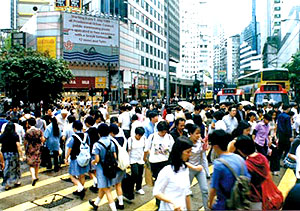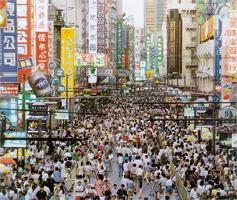The Hong Kong stage is set again for a prolonged battle over "nativism" in the wake of a proposed arrangement by Hong Kong municipal authorities. The edict grants Shenzhen residents free entry to the city but local Hong Kongers are ranting and raving about the surging non-native population.
Last August, Donald Tsang Yam-kuen, chief executive of the Hong Kong Special Administration Region (HKSAR) Government, proposed that the Hong Kong government offer wider access to Shenzhen residents by granting them the right to free entry.
Immediately after the proposal, Mingpao, a Hong Kong-based newspaper, polled the public regarding the proposal and found it to be heartily unwelcome.
Hong Kong websites vehemently broadcast hostile words directed at these invasive non-natives. But Chinese mainlanders feel that their Chinese sister metropolis should strike a more tolerant and accommodating pose, especially given the international spirit of Hong Kong.
One can infer that this emotional outpouring has much to do with concern about, and fear of, maintaining public order and security.
In Shenzhen the high incidence of robberies has made the city notoriously unsafe. Linked with Shenzhen both geographically and economically, Hong Kong citizens fear that a crime epidemic will sprout in their city after it becomes more accessible to Shenzhen residents.
Competition for local jobs from non-natives also spurs their anger. There is no doubt that this population increase will cause the job market to become cutthroat.
"As for the IT industry, mainland talents are more competitive. We're placed at a disadvantage, Hong Kong locals will have a hard time," Liu Hongliang, an IT worker said.
But more people are attaching blame on mainland migrant workers, a special social group. Natives along with government authorities attribute social ill onto them, often applying labels like "unfit and laggard" to migrant workers. As a group they are considered to be lacking in both intelligence and education; they are not "good" civilians.
But have the natives ever thought about what would become of the city if the migrant workers disappeared for just one day?
Hong Kong locals do not permit even the slightest presence of simplified Chinese characters; they use the original Chinese characters in their daily lives. Late last year, a signpost with simplified Chinese characters erected in a building complex incurred a barrage of criticism. Citizens warned that their language had been subverted.
In China the issue of who is native and who is non-native can be complicated. Hong Kong's example shows a westernized Chinese city that re-entered the motherland. Hong Kong represents a mini-world of capitalist wealth and luxury: an opportunity for a better life. But as more mainlanders migrate to Hong Kong the locals feel angry and threatened.
These days, non-natives in other big cities are also in a bind. Migrants receive both blame and credit. They have made the economy strong while causing higher unemployment. They have gone to great lengths to help the city build houses while simultaneously snatching the homes of local residents.
Shanghai is another example. Since Shanghai pushed for development in the 1980s, the city has absorbed increasing numbers of migrants. At the same time, the city has revamped its look by demolishing and rebuilding entire neighborhoods. For those who associate progress with new construction the development appears positive. But for many natives, this large-scale demolition opens painful wounds, because many were forced from their downtown homes into the suburbs, previously known to locals as "countryside".
Guangzhou is another example. When the heart of the city became the business center, the urban natives were relocated on the periphery of the city. Certainly this decentralization helped the influx of new residents but it definitely demoralized the local population.
Some nostalgic natives consider the new comers detrimental to their long-honored traditions and lifestyle. The new comers bring in their own cultural baggage: dialects and languages, traditions and food. Sichuan cuisine has become commonplace in Beijing, Shanghai and other big cities, with local food offers as a sad alternative choice.
Local people have reason to resist the non-natives. Once they lose their culture, they have lost everything. In an international city like Beijing or Shanghai, Hong Kong or Guangzhou, where foreign guests almost usurp their host's role by sheer numbers, the natives may have no choice but to resist.
Voices: Non-natives Natives
(China.org.cn by He Shan, September 20, 2007)



